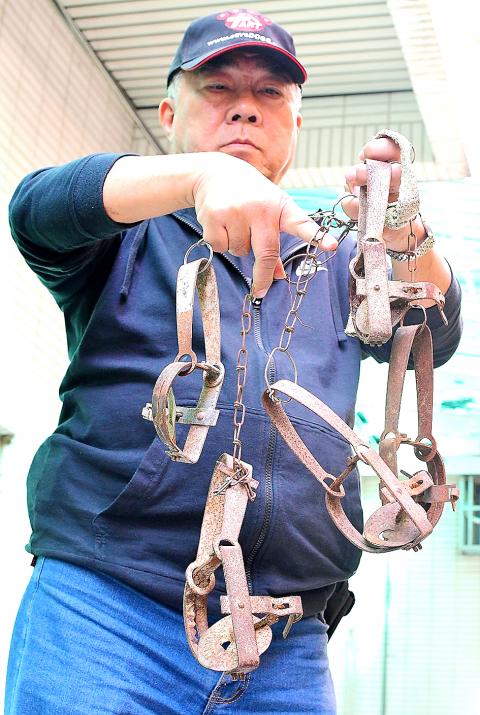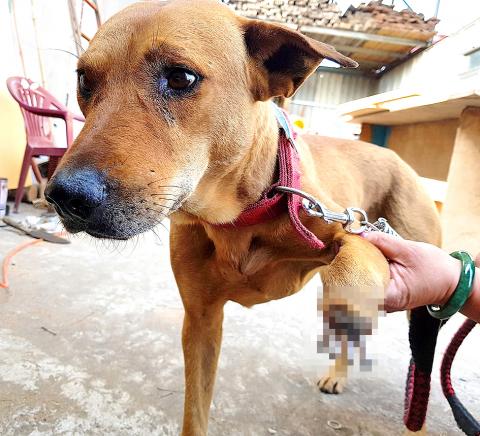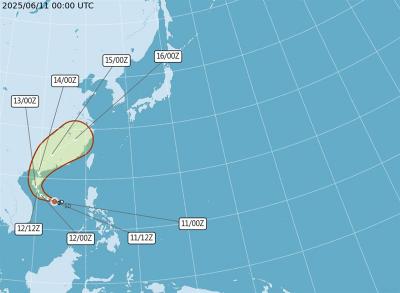Members of the Animal Rescue Team Taiwan are calling for better enforcement of laws prohibiting the use of animal traps, after three dogs in Kaohsiung lost their legs to the devices last week.
One of the injured dogs, which lost a front leg, was nursing a litter when it was found, the team said.
Laws should be amended to allow the city’s Animal Protection Office to more effectively seize traps to prevent a recurrence of such “heart-wrenching” incidents, they added.

Photo courtesy of Animal Rescue Team Taiwan
Last week, the team was called to rescue three dogs in the city’s Liouguei (六龜) and Tianliao (田寮) districts, and Singda Harbor (興達港), and rushed the dogs to surgery to save their lives, the team said.
Article 14-2 of the Animal Protection Act (動物保護法) prohibits the manufacture, sale, import, export and display of animal traps unless authorized by the central government.
The act was amended on June 29, 2011, because the authorities said the traps were a “cruel implement of slaughter and should forever disappear from Taiwan,” rescue team spokesperson Anthony Ni (倪京台) said.

Photo courtesy of Animal Rescue Team Taiwan
Despite the amendment, the number of cases handled by the team involving cats and dogs mutilated by traps has not dropped over the past seven years, he said.
Only 10 percent of animals caught in traps have been saved, with a majority dying from sepsis, he said.
Protected animals also get caught in the traps, Ni said, citing reports of leopard cats and Formosan bears coming in contact with the devices.
Moreover the Animal Protection Act only prohibits the manufacture, sale, import, export and display of traps, but not ownership — a legal loophole that many people exploit, he said.
“Faced with the threat of their traps being seized, some people simply tell authorities that they had bought the traps long ago and that they are only keeping them in storage,” he said.
In 2016, the Kaohsiung City Government was the first in the nation to introduce a municipal ordinance that closed this loophole by banning ownership of traps, he said.
City authorities informed the local hardware association about the ordinance and conducted random inspections of association members, he said.
However, the law is difficult to enforce in remote mountain communities, he said.
Every year the Kaohsiung Animal Protection Office offers free vaccination shots for rabies and other diseases to pet owners in remote rural communities.
In the process of administering vaccines it usually encounters pets with severed limbs, which their owners say were caused by the pets running off into the mountains and forests, the office said.
“Some of the traps are made by people on their own. This is just something you cannot guard against,” Ni said.
The office cooperates with local government offices and civic animal protection groups to search for traps in the mountains, and posts signage along mountain trails to remind the public that traps are illegal, he said.
The Animal Protection Act stipulates that those found making, selling, importing, exporting or exhibiting traps may be fined up to NT$75,000 (US$2,436), while Kaohsiung’s municipal ordinance prohibiting trap ownership stipulates a fine of NT$15,000.
If the use of a trap results in the death or debilitation of an animal, the owner of the trap may be fined up to NT$2 million and face up to two years in prison, as stipulated in Article 25 of the act, Animal Protection Office director Yeh Kun-sung (葉坤松) said.

A magnitude 6.4 earthquake struck off the coast of Hualien County in eastern Taiwan at 7pm yesterday, the Central Weather Administration (CWA) said. The epicenter of the temblor was at sea, about 69.9km south of Hualien County Hall, at a depth of 30.9km, it said. There were no immediate reports of damage resulting from the quake. The earthquake’s intensity, which gauges the actual effect of a temblor, was highest in Taitung County’s Changbin Township (長濱), where it measured 5 on Taiwan’s seven-tier intensity scale. The quake also measured an intensity of 4 in Hualien, Nantou, Chiayi, Yunlin, Changhua and Miaoli counties, as well as

Taiwan is to have nine extended holidays next year, led by a nine-day Lunar New Year break, the Cabinet announced yesterday. The nine-day Lunar New Year holiday next year matches the length of this year’s holiday, which featured six extended holidays. The increase in extended holidays is due to the Act on the Implementation of Commemorative and Festival Holidays (紀念日及節日實施條例), which was passed early last month with support from the opposition Chinese Nationalist Party (KMT) and Taiwan People’s Party. Under the new act, the day before Lunar New Year’s Eve is also a national holiday, and Labor Day would no longer be limited

COMMITMENTS: The company had a relatively low renewable ratio at 56 percent and did not have any goal to achieve 100 percent renewable energy, the report said Pegatron Corp ranked the lowest among five major final assembly suppliers in progressing toward Apple Inc’s commitment to be 100 percent carbon neutral by 2030, a Greenpeace East Asia report said yesterday. While Apple has set the goal of using 100 percent renewable energy across its entire business, supply chain and product lifecycle by 2030, carbon emissions from electronics manufacturing are rising globally due to increased energy consumption, it said. Given that carbon emissions from its supply chain accounted for more than half of its total emissions last year, Greenpeace East Asia evaluated the green transition performance of Apple’s five largest final

The first tropical storm of the year in the western North Pacific, Wutip (蝴蝶), has formed over the South China Sea and is expected to move toward Hainan Island off southern China, the Central Weather Administration (CWA) said today. The agency said a tropical depression over waters near the Paracel and Zhongsha islands strengthened into a tropical storm this morning. The storm had maximum sustained winds near its center of 64.8kph, with peak gusts reaching 90kph, it said. Winds at Beaufort scale level 7 — ranging from 50kph to 61.5kph — extended up to 80km from the center, it added. Forecaster Kuan Hsin-ping